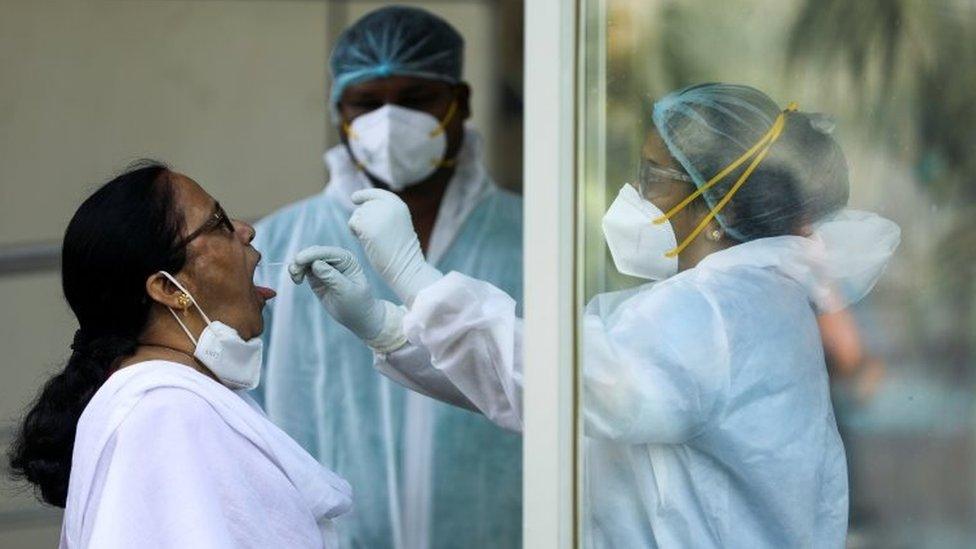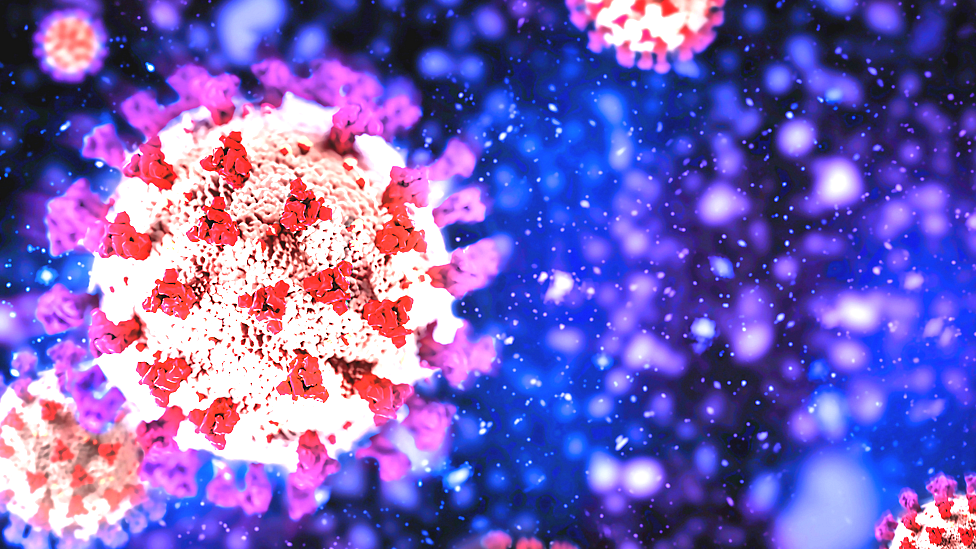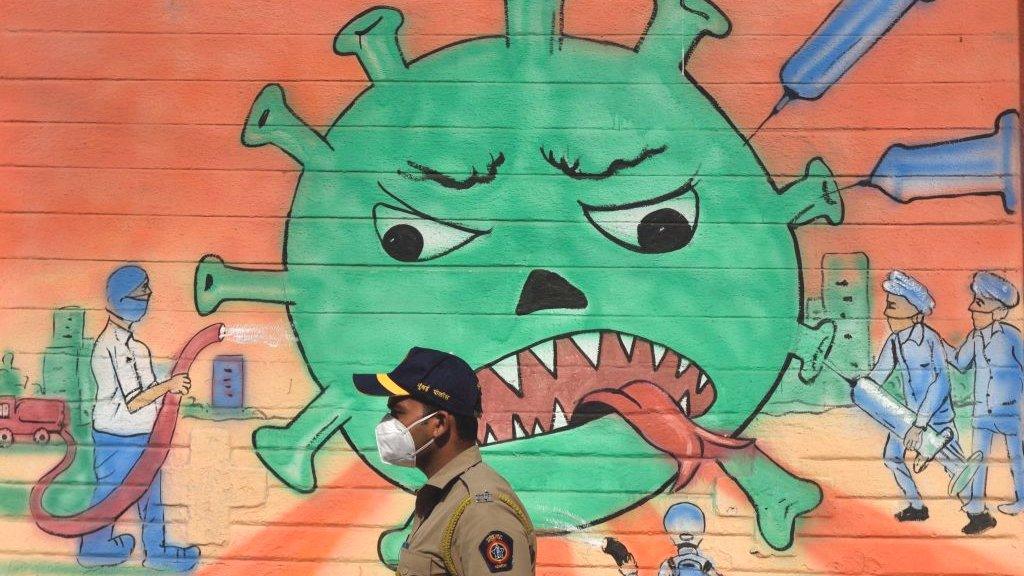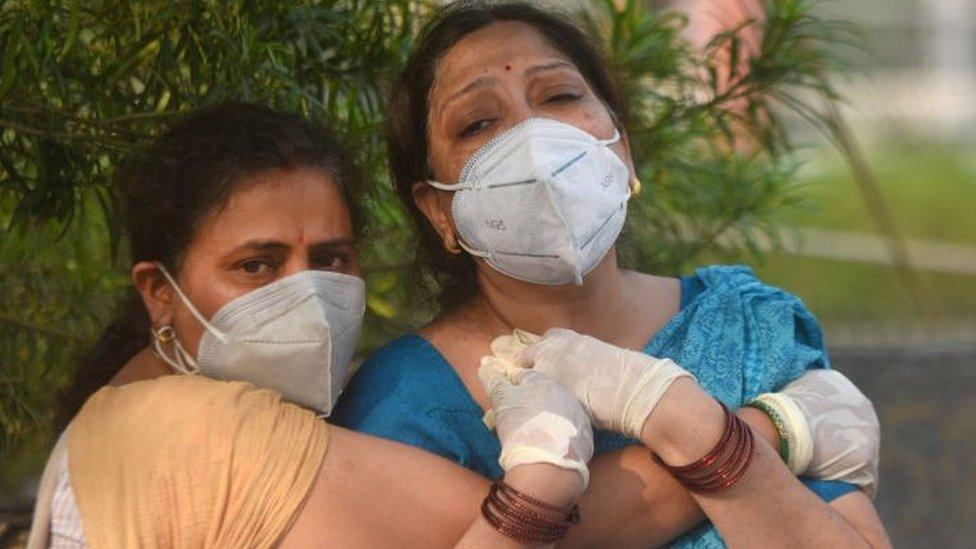PM: India coronavirus variant must be 'handled carefully'
- Published

A coronavirus variant first identified in India is being investigated by scientists across the world
The Prime Minister has said the government needs to carefully handle outbreaks of the India variant of coronavirus in the UK.
It comes as Public Health England (PHE) said one version of it had been elevated to a "variant of concern".
B.1.617.2 appears to be spreading more quickly than two other identified subtypes of the Indian variant.
Scientists believe it is at least as transmissible as the variant first detected in Kent last year.
Boris Johnson said the government needs to think "very carefully" about the public health response.
"We're doing a huge amount, obviously, to make sure that when we do find outbreaks of the Indian variant that we do surge testing, that we do door-to-door testing," he said.
PHE said there was currently "insufficient evidence" to indicate that any of the variants recently detected in India cause more severe disease or make current vaccines any less effective.
Scientists are now carrying out laboratory testing to better understand the impact of the mutations on the behaviour of the virus.
Variant of concern
Viruses mutate all the time, producing different versions of themselves. Most of these mutations are insignificant - and some may even make the virus less dangerous - but others can make it more contagious and harder to vaccinate against.
The original India variant - officially known as B.1.617 - was first detected in October.
That version has now been re-characterised as three different subtypes, all with slightly different genetic mutations.
Why do new variants of Covid-19 keep appearing? BBC's health reporter Laura Foster explains
The UK has seen a sharp increase in one type in particular, known as B.1.617.2, which now makes up the majority of all Indian variant cases and appears to be growing faster than other versions.
Cases have increased from 202 to 520 in the last week, with most detected in London and the North West of England.
Almost half were related to travel or contact with a traveller but there have been examples of community transmission linked to work and religious gatherings.
In one cluster at a care home, 14 elderly residents who had all been vaccinated, were infected with the variant, a source told the BBC. A number needed hospital treatment, but not for severe disease, and it is thought all have now recovered.
All current vaccines are thought to offer some degree of protection against variants but can never completely stop all infections, especially among vulnerable or elderly people.


It is tempting to conclude that because there is now evidence this variant is more infectious and because cases have risen rapidly in the UK, this marks the start of the rise of this Indian variant.
But there are some good reasons why we should not jump to that conclusion.
The rapid rise in cases is being linked to an increase in international travel from India ahead of the country being put on the "red list".
There are some early signs in the data, Public Health England sources say, that the increase may be coming to an end, meaning that it may reflect that rise in travel rather than significant community spread.
Two key factors are in our favour - the vaccines appear to work just as well against this variant as the dominant virus circulating in the UK (although uptake in the Indian community is a little lower) plus there are still significant social distancing restrictions in place that should help to limit spread.
Lots of testing and contact tracing in different areas are taking place - and some surge testing is expected to be announced later in areas where there is most concern.
It will be a couple of weeks before we know for sure. The message is clear - this needs to be taken seriously, but there is no need to panic.

PHE said extra surge testing was now being put in place in affected areas along with more targeted contact tracing to try and stop the spread of the variant.
All individuals living in specific postcodes will be asked to get a PCR test, even if they don't have symptoms.
Enhanced testing is already being rolled out in parts of Bolton which has seen an increase in cases of B.1.617.2 in the last week.
Anyone living, working or studying in the Rumworth, Deane or Great Lever areas is strongly urged to visit a mobile testing unit, whether they have symptoms or not.
"The way to limit the spread of all variants is the same and although we are all enjoying slightly more freedom, the virus is still with us," said Dr Susan Hopkins, Covid-19 strategic response director at PHE.
"We are monitoring all of these variants extremely closely and have taken the decision to classify this as a variant of concern because the indications are that it is more transmissible."

VACCINE: When will I get the jab?
GLOBAL SPREAD: How many worldwide cases are there?
NEW VARIANTS: How worried should we be?
QUARANTINE: Will I need to self-isolate in a hotel?

Laboratory work is needed to sequence individual Covid tests and identify specific variants, meaning the latest figures are likely to represent the situation about a week ago.
Figures from the Wellcome Sanger Institute, which analyses positive swabs for different variants, also showed clusters of B.1.617.2 in places including Leicester, Bolton, Nottingham and Blackburn in the week to 24 April.
It comes as seven confirmed cases of the same variant have been detected in Northern Ireland - the first discovered in the region.


India has said the B.1.617 variant may be linked to a deadly second coronavirus wave that has swept the country in recent weeks.
The country reported a record 412,000 cases in the space of 24 hours on Wednesday, and 3,980 deaths.
The surge in infections has already overwhelmed the healthcare system with hospital beds, oxygen and even crematorium space in short supply, while several states are under localised lockdowns and curfews.
Additional reporting by Ella Willis.
Related topics
- Published1 July 2022

- Published7 May 2021
- Published7 May 2021

- Published5 May 2021
